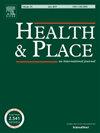Regional disparities in cognitive life expectancy: The role of birth and current residence in the United States
IF 4.1
2区 医学
Q1 PUBLIC, ENVIRONMENTAL & OCCUPATIONAL HEALTH
引用次数: 0
Abstract
Regional disparities in cognitive impairment are well-documented, but the combined impact of birth and current residence remains unclear. Prior studies examine geographic patterns, yet none estimate years spent in different cognitive states—key for understanding long-term health and policy implications. Using data from the 1998–2020 Health and Retirement Study (105,491 observations from 19,213 individuals), we employ a Bayesian multistate life table approach to estimate cognitively healthy and impaired life expectancies at age 50 across different combinations of birth and current regions. Our findings show that birth region plays a stronger role in cognitive impairment risk than current residence. At age 50, Southern-born individuals, regardless of where they live later, have fewer years without cognitive impairment (Men: 20.5–21.5; Women: 24.8–25.4) and more years with dementia (Men: 2.3–2.5; Women: 3.0–3.1) than those born elsewhere. Those both born and living in the South have the shortest cognitively healthy life expectancy. Regional differences based on current residence alone are minimal and only evident when considered alongside birthplace. Beyond the Southern birth disadvantage, we also identify a Western birth disadvantage, particularly in life expectancy with dementia and, for women, a higher percentage of life spent with cognitive impairment but not dementia. This suggests that Western-born individuals, especially women, may experience prolonged cognitive decline even if they avoid full-blown dementia. These findings provide new evidence of the lasting impact of early-life geographic exposures on cognitive impairment risk, underscoring that growing up in certain regions, particularly the South and, in some respects, the West, can shape cognitive health trajectories decades later.
认知预期寿命的地区差异:美国出生和当前居住地的作用
认知障碍的地区差异有充分的证据,但出生和居住地的综合影响尚不清楚。先前的研究考察了地理模式,但没有一个研究估计在不同认知状态下花费的时间——这是理解长期健康和政策影响的关键。使用1998-2020年健康与退休研究的数据(来自19213个人的105491次观察),我们采用贝叶斯多状态生命表方法来估计不同出生地区和当前地区不同组合的50岁认知健康和受损预期寿命。我们的研究结果表明,出生地区在认知障碍风险中起着比目前居住地更大的作用。在50岁时,南方出生的人,无论他们以后住在哪里,没有认知障碍的时间更短(男性:20.5-21.5;女性:24.8-25.4岁)及以上痴呆年龄(男性:2.3-2.5岁;女性:3.0-3.1)比其他地方出生的人多。出生和生活在南方的人的认知健康预期寿命最短。仅基于当前居住地的地区差异很小,只有在与出生地一起考虑时才明显。除了南方的先天劣势之外,我们还发现了西方的先天劣势,特别是在患痴呆症的预期寿命方面,对于女性来说,患认知障碍而非痴呆症的比例更高。这表明,西方出生的人,尤其是女性,即使没有患上全面的痴呆症,也可能经历长期的认知衰退。这些发现提供了新的证据,证明早期生活的地理环境对认知障碍风险的持久影响,强调了在某些地区,特别是南方,在某些方面,西方,可以塑造几十年后的认知健康轨迹。
本文章由计算机程序翻译,如有差异,请以英文原文为准。
求助全文
约1分钟内获得全文
求助全文
来源期刊

Health & Place
PUBLIC, ENVIRONMENTAL & OCCUPATIONAL HEALTH-
CiteScore
7.70
自引率
6.20%
发文量
176
审稿时长
29 days
期刊介绍:
he journal is an interdisciplinary journal dedicated to the study of all aspects of health and health care in which place or location matters.
 求助内容:
求助内容: 应助结果提醒方式:
应助结果提醒方式:


